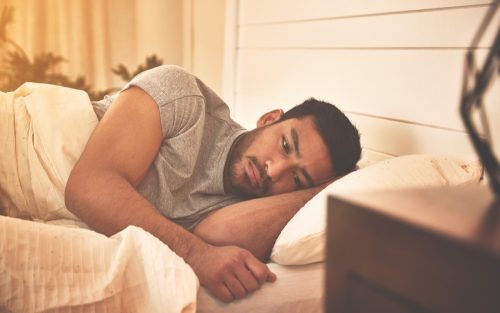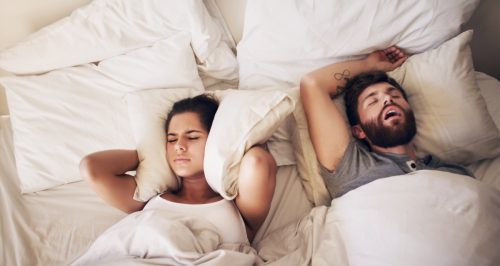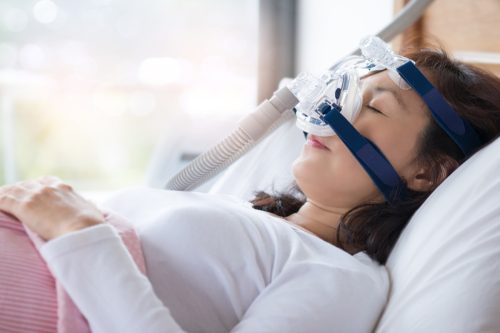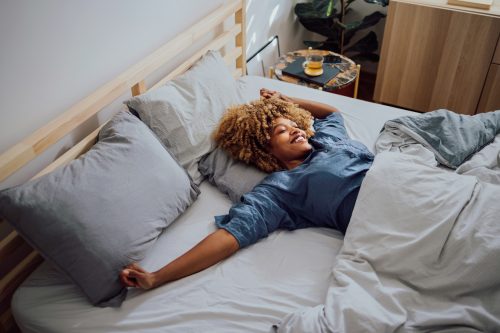Are You Waking Up Tired Every Morning?
Many of us consider our morning alarm clock to be the most unwelcome sound we hear every day. Sure, some people wake up with the sun feeling refreshed and energized. But for too many others, sleep seems to have the opposite effect. And while there could be a number of issues contributing to this, the U.S. Food and Drug Administration (FDA) is cautioning people against writing off their daily exhaustion. In fact, the agency says waking up tired every morning could be a symptom worth seeing a doctor about. Read on to find out what the FDA advises.
READ THIS NEXT: If You Sleep in This Position, You Could Be Hurting Your Spine, Experts Warn.
If you’re waking up feeling tired all the time, you’re hardly alone. The U.S. is one tired country.
A 2020 survey conducted by OnePoll on behalf of sleep and circadian rhythm supplement maker RestoreZ found that 65 percent of people throughout the country said they rarely wake up feeling rested and energized.
That has only gotten worse. A separate survey conducted by OnePoll on behalf of Serta Simmons Bedding for Sleep Awareness Month discovered that less than a third of adults report feeling refreshed when they wake up in the morning in 2022. For this survey, the few who said they had “excellent” sleep usually go to bed around 9:30 p.m. But the average person goes to sleep at 10 p.m. and a fifth of respondents go to bed even later, according to the survey.
However, when it comes to feeling tired when you wake up, it could be more than just not getting enough sleep.

According to the FDA, waking up tired every day actually be a sign that you’re dealing with a serious health issue: obstructive sleep apnea (OSA). “Something might be going wrong while you sleep that you don’t know about,” the agency warns.
OSA is a sleep-related disorder that causes people to stop breathing in their sleep, the FDA explains. People with this condition experience five or more pauses in their breathing each hour.
“During these breathing pauses, your brain, heart, kidneys, and other essential organs do not get enough oxygen, and carbon dioxide can build up in your body,” the agency says. “When your brain notices there is not enough oxygen and too much carbon dioxide in your body, it sends out a signal to take a breath.”
So, how does OSA make you wake up feeling tired in the morning? The FDA says that when these episodes happens, people wake up just enough to take a few breaths, but not enough that they typically remember the next day. “This cycle repeats itself many times each night, making you feel tired or exhausted in the morning,” the agency says.
For more health advice delivered straight to your inbox, sign up for our daily newsletter.

Constant fatigue can be a sign of a number of different underlying health issues, but when it comes to sleep apnea, you’re likely to have other symptoms. If you’re sharing a bed with someone, you can ask them if they notice you snoring loudly, snorting, or making a choking sound once you start breathing after a pause, according to the FDA.
The agency says that other symptoms associated with OSA include waking up with a dry throat or headache, waking up often during the night, and difficulty concentrating or mood changes during the dry.
“Talk to your doctor if you experience symptoms of sleep apnea,” the FDA advises. “The diagnosis of a sleep disorder such as OSA requires a sleep study done in a sleep lab or at home. A diagnosis will determine if your OSA is mild, moderate, or severe based on the average number of times you stop breathing each hour during sleep.”

Getting treatment for your OSA can help with your exhaustion. “Many FDA-approved and FDA-cleared treatments can help people with OSA wake up in the mornings feeling rested and refreshed, improving their overall health,” Eric Mann, MD, deputy clinical director for the FDA’s Center for Devices and Radiological Health, said in a statement.
But the agency says feeling more rested is not the only reason to get your sleep apnea taken care of.
“Getting treatment for OSA is key because OSA not only affects your sleep but increases your risk of serious health problems and even death,” the FDA explains. According to the agency, this form of sleep apnea can raise your risk of heart attack, stroke, type 2 diabetes, glaucoma, and some types of cancer, alongside other concerning conditions. Research from Yale University found that having sleep apnea can increase a person’s risk of dying by 30 percent.
“OSA treatments can work well to manage OSA, but not every treatment is right for everyone. Some treatments work best for people with mild OSA while others are best for people with more severe OSA,” the FDA says. “Sometimes you must try a specific treatment before you can move on to a different treatment. Some treatments involve surgery to correct a narrow airway or a specific part of the airway that may collapse during sleep. Any type of surgery has risks, so talk with your doctor about all of your options before you decide.”
" Conservative News Daily does not always share or support the views and opinions expressed here; they are just those of the writer."




Now loading...